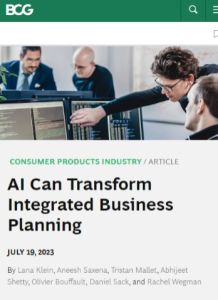Companies aspiring to develop better strategies and forecasts are turning to AI-driven integrated business planning (IBP) platforms to do so. The latest research from Boston Consulting Group shows that if you hope to better navigate uncertainty and remain competitive, adopting an AI-driven IBP system can enable you to create more accurate forecasts, while increasing the ease and speed of your planning process. But the transition from conventional IBP approaches to an AI-enabled one isn’t easy – gain valuable insights into how to drive the most possible value, harness the full potential of your data and optimally manage your transformation.
Better navigate uncertainty with AI-driven integrated business planning (IBP).
During and following the COVID-19 pandemic, it became clear that many companies were strategically unprepared for the crisis. To better navigate uncertainty going forward, companies are leveraging AI-driven platforms as an alternative solution to conventional IBP, which has few optimization or predictive capabilities. AI-enabled IBP platforms can help your company create a “rich data fabric,” while providing algorithm-driven decision-making support and automating your entire planning process. Adopting AI-driven IBP can also boost job satisfaction by systemizing work, freeing team members to focus more on innovation and strategic tasks.
You’ll likely encounter challenges when switching to an AI-driven IBP system though, as it’s not simple to design or deploy and can cost your business tens of millions of dollars. In fact, large corporations should expect to invest more than $100 million. Many invest heavily in AI-driven IBP, only to discover that they didn’t realize as much value as they’d hoped. Such challenges arise due to common ...
Tristan Mallet, Lana Klein, Aneesh Saxena, Abhijeet Shetty, Olivier Bouffault, Daniel Sack and Rachel Wegman are professionals with Boston Consulting Group.
























Comment on this summary